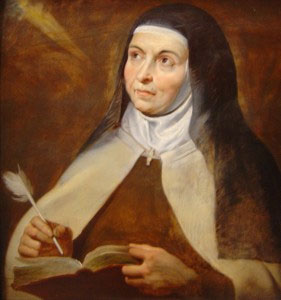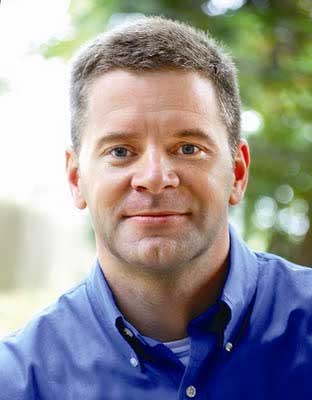 Christopher West continues to offer to us work that is compelling, as well as challenging, in regards to our deepest desires…the yearning in our hearts that can only find rest in God.  Through the Scriptures, the writings of the Saints, and the teachings of the Church, Christopher West helps us to understand that so much of what we seek and how we seek it, especially expressed through our bodies, cannot be authentically found in what our culture offers.  The only place where true peace, joy, and fulfillment can be found is in the abundant love and grace  which resides in the Heart of  God who longs for us…it is up to us to respond.
Christopher West continues to offer to us work that is compelling, as well as challenging, in regards to our deepest desires…the yearning in our hearts that can only find rest in God.  Through the Scriptures, the writings of the Saints, and the teachings of the Church, Christopher West helps us to understand that so much of what we seek and how we seek it, especially expressed through our bodies, cannot be authentically found in what our culture offers.  The only place where true peace, joy, and fulfillment can be found is in the abundant love and grace  which resides in the Heart of  God who longs for us…it is up to us to respond.
[powerpress]
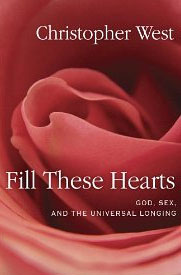 You can find the book here
You can find the book here
“Christopher West is a gifted and effective evangelist with a passion for tackling one of the greatest obstacles to belief today: the heresy that Christianity is a joyless, rule-bound religion. Not so, argues West, in this timely, powerful book. Drawing upon Scripture, the saints and the glimmers of truth in pop culture, West reminds us that Christianity is essentially a love story, and Christian sexual ethics exist to help us fulfill, not repress, our deepest desires. For anyone who has ever doubted that Christ’s call to purity of heart is good news, Fill These Hearts will prove a surprising and consoling read, one with the potential to change your life as well as your mind.”
–Colleen Carroll Campbell, author of My Sisters the Saints: A Spiritual Memoir
Tags: Christopher West
This entry was posted on Thursday, March 28th, 2013 at 11:32 am
You can follow any responses to this entry through the RSS 2.0 feed.
“Walk Humbly Before Your God: Â Simple Steps to a Virtuous Life” is an all-time favorite. Â Fr. Andrew Apostoli,
member of the Franciscan Friars of the 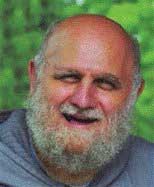 Renewal and a frequent host on the Eternal Word Television Network, has a beautiful way of shining new light on basic truths.  He graciously takes time to teach us on the nature of prayer,  how it develops in our lives and how we can nurture it.  He speaks on Jesus and several aspects surrounding His prayer: praise, thanksgiving, intercession, and how it aids in our suffering.  Our traditional vocal prayers, as well as the depths of contemplation are also discussed including how do we deal with distractions, .  Fr. Apostoli, a humble holy priest, is a master spiritual catechist!  Contained in this 50 minute discussion, you’ll find guidance that can last a lifetime.
Renewal and a frequent host on the Eternal Word Television Network, has a beautiful way of shining new light on basic truths.  He graciously takes time to teach us on the nature of prayer,  how it develops in our lives and how we can nurture it.  He speaks on Jesus and several aspects surrounding His prayer: praise, thanksgiving, intercession, and how it aids in our suffering.  Our traditional vocal prayers, as well as the depths of contemplation are also discussed including how do we deal with distractions, .  Fr. Apostoli, a humble holy priest, is a master spiritual catechist!  Contained in this 50 minute discussion, you’ll find guidance that can last a lifetime.
[powerpress]
You can find Fr. Apostoli’s book here
From the book description:
Christians, if they are to have any impact in today s world, have something of the same code: we fight the good fight, side by side, ready to lay down our lives for one another. Such heroism doesn t come naturally. As Walk Humbly With Your God points out, it is in the day-to-day training, in taking the simple steps to holiness, that heroism becomes second nature.
Fr. Apostoli provides an inspirational guide to conquering our faults, growing in prayer and acquiring the virtues that enable us to walk with God and live for others.
This entry was posted on Monday, March 18th, 2013 at 7:52 am
You can follow any responses to this entry through the RSS 2.0 feed.
I so enjoyed my conversation with Dr. Lawrence Cunningham.  In his book, “The Seven Deadly Sins: A 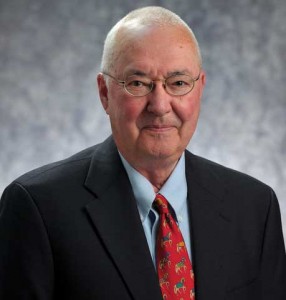 Visitor’s Guide“, Dr. Cunningham draws from the wisdom of  the mystical desert fathers.  He offers us insight on sloth, envy, gluttony, greed, anger, lust and pride – how they were first identified as the “deadly”sins, what they might look like in today’s world, and how corresponding virtues can counter their destructive tendencies.  A fascinating read!
Visitor’s Guide“, Dr. Cunningham draws from the wisdom of  the mystical desert fathers.  He offers us insight on sloth, envy, gluttony, greed, anger, lust and pride – how they were first identified as the “deadly”sins, what they might look like in today’s world, and how corresponding virtues can counter their destructive tendencies.  A fascinating read!
[powerpress]
You can find the book here
“At a time when invective poses as ‘straight talk,’ and the rant replaces reasoned discourse, Lawrence Cunningham’s brilliant new meditation on the Seven Deadly Sins is pure gift. Moral confusion may be the defining weakness of our era, but here is a book that can lead us back to the light.”–Paula Huston, Author of Simplifying the Soul
Tags: 7 deadly sins, Lawrence Cunningham, Seven Deadly Sins
This entry was posted on Wednesday, March 6th, 2013 at 3:20 pm
You can follow any responses to this entry through the RSS 2.0 feed.
“Eucharistic Adoration: Holy Hour Meditations on the Seven Last Words of Christ” is a marvelous book for 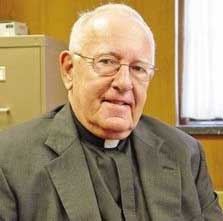 enhancing your experience of one of the Church’s richest devotions.  Msgr. Charles Murphy pours into this work over 50 years of priestly life and pastoral experience in spreading the devotion to the Blessed Sacrament.  He ties together reflections on the seven last words of Jesus with the profiles of seven modern Christians known for their devotion to the Eucharist, including Simone Weil, Edith Stein, Dorothy Day, Blessed John XXIII, Blessed John Paul II, Blessed Teresa of Calcutta, and St. Margaret Mary Alacoque.  In this conversation, we also discuss his book “The Spirituality of Fasting”
enhancing your experience of one of the Church’s richest devotions.  Msgr. Charles Murphy pours into this work over 50 years of priestly life and pastoral experience in spreading the devotion to the Blessed Sacrament.  He ties together reflections on the seven last words of Jesus with the profiles of seven modern Christians known for their devotion to the Eucharist, including Simone Weil, Edith Stein, Dorothy Day, Blessed John XXIII, Blessed John Paul II, Blessed Teresa of Calcutta, and St. Margaret Mary Alacoque.  In this conversation, we also discuss his book “The Spirituality of Fasting”
[powerpress]
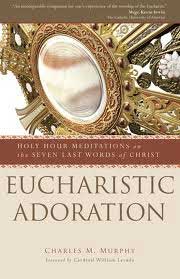 You can find the book here
You can find the book here
Monsignor Charles M. Murphy is currently the director of the permanent diaconate for the Diocese of Portland, Maine. He is the author of a number of scholarly articles and several books, including The Spirituality of Fasting, At Home on the Earth, Wallace Stevens: A Spiritual Poet in a Secular Age, and Belonging to God. Murphy is the former academic dean and rector of the Pontifical North American College in Rome and served as part of the editorial group working in Italy under Cardinal Ratzinger on the third draft of the Catechism of the Catholic Church, which became the fourth and final version.
Murphy currently serves as consultant to the United States Conference of Catholic Bishops committee on catechetics, reviewing materials for conformity with the Catechism. He served as chair of the editorial committee that produced the pastoral letter on environmental issues by the Bishops of the Boston Province and he served as a consultant to the USCCB for their statement on global warming. He has been the pastor of four parishes in Maine and has served his diocese in ecumenical and educational capacities. Murphy holds a doctorate in sacred theology from the Gregorian University, a master’s degree in education from Harvard University, and a bachelor’s degree in classics from the College of the Holy Cross.
Tags: Charles Murphy, eucharistic adoration, margaret mary alacoque, Simone Weil
This entry was posted on Tuesday, February 19th, 2013 at 2:48 pm
You can follow any responses to this entry through the RSS 2.0 feed.
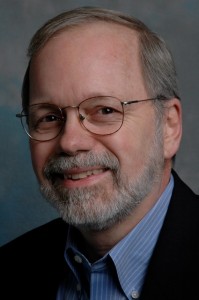 It’s all about conversion…continually turning towards the Lord and allowing Him to heal us. Deliverance ministry really acknowledges the power of Jesus Christ to make all things new and to heal the damage done to us by sin and those spirits which get into our brokeness and wounds to drive us away from God. Neil Lozano has done extraordinary work with the “Unbound Ministries” ; it truly allow us to let the Father “deliver us from evil”. This is one of the best books I have ever read on the subject. Absolutely a must for everyone on the spiritual journey!!! “Be not afraid”, an
It’s all about conversion…continually turning towards the Lord and allowing Him to heal us. Deliverance ministry really acknowledges the power of Jesus Christ to make all things new and to heal the damage done to us by sin and those spirits which get into our brokeness and wounds to drive us away from God. Neil Lozano has done extraordinary work with the “Unbound Ministries” ; it truly allow us to let the Father “deliver us from evil”. This is one of the best books I have ever read on the subject. Absolutely a must for everyone on the spiritual journey!!! “Be not afraid”, an d really “all you need is love”.
d really “all you need is love”.
find Neil’s work at www.heartofthefather.com
[powerpress]
From the book description:
Do you feel chained to a particular sin pattern that you cannot break?
Do you still feel guilty, ashamed, and doomed to repeat a besetting sin even after receiving the sacrament of Reconciliation?
Then you may find a way to spiritual freedom through deliverance prayer.
In Resisting the Devil, author Neal Lozano shows that sometimes evil spirits tell us lies that lock us into sins and personal problems. He explains the practice of deliverance, a way of dealing with such demonic influences that is supported by the teaching and traditionof the Catholic Church.
–Learn how to recognize the activity of evil spirits
–See how deliverance from spiritual bondage can be gentle, safe, and effective –Understand how deliverance differs from exorcism and how deliverance and Reconciliation can work together–Read the testimonies of women and men who have been freed through deliverance ministry.
This entry was posted on Sunday, February 17th, 2013 at 12:45 am
You can follow any responses to this entry through the RSS 2.0 feed.
 It’s great to be joined once again by Mark Brumley, this time to discuss  “Knowing God: God and the Human Condition” (previously titled God and the Human Mind) authored by the great Catholic writer, teacher, and publisher Frank Sheed.  Written in 1966 during the time of the Second Vatican Council, Sheed  addresses the most challenging questions the human mind can pose about God, without presenting answers in dry academic way.  Instead, because of his gifted writing style, he engages the reader with a desire to discover “mystery” in all its forms.
It’s great to be joined once again by Mark Brumley, this time to discuss  “Knowing God: God and the Human Condition” (previously titled God and the Human Mind) authored by the great Catholic writer, teacher, and publisher Frank Sheed.  Written in 1966 during the time of the Second Vatican Council, Sheed  addresses the most challenging questions the human mind can pose about God, without presenting answers in dry academic way.  Instead, because of his gifted writing style, he engages the reader with a desire to discover “mystery” in all its forms.
[powerpress]
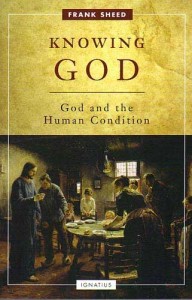 You can find the book here
You can find the book here
“This book is vintage Sheed: clear, commonsensical, and convincing. This is the Sheed of the two masterpieces of apologetics Theology and Sanity and Society and Sanity. But this is also a new Sheed: older and wiser, more practical and human–the post-Vatican II Sheed. I mean this in all the good senses, the John Paul II senses: he is sensitive to the dangers of “the good old days”: verbalism, “dead orthodoxy,” rationalism, deism, what Sheed calls “theometry” instead of theology: an abstract, formal theological geometry that only wants to define terms and win debating points. Instead, this book is a kind of theological midrash, a deepening, a spelunking in the caves of the deepest mysteries with the clear light of honest words–honest with heart as well as head. It unites dogmatic theology with lived religion. It is precisely the breath of fresh air that Pope John XXIII opened the windows for, and in terms the layman can clearly grasp. —– Peter Kreeft, Author, Because God is Real
Tags: catholic, catholic podcast, catholic prayer
This entry was posted on Tuesday, February 12th, 2013 at 2:48 am
You can follow any responses to this entry through the RSS 2.0 feed.
Paula Huston is one of the finest spiritual writers alive today.  Her books speak to the human heart in such a beautiful, gentle way.  She  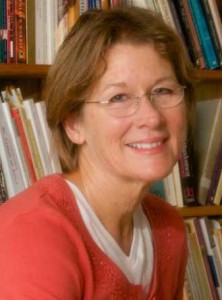 inspires us to climb higher the spiritual mountain, even when the times are treacherous and rocky.  In  “A Season of Mystery: 10 Spiritual Practices for Embracing a Happier Second Half of Life”, she encourages us to slow down, in order to nurture the relationship God is offering us today.  For many of us, it may involve a paradigm shift, but one that is well worth the effort if we choose to enter into it.  Paula breaks open each practice found in her book with moments from her own experience. She then gives us practical helps which can transform our everyday lives.  Those practices include listening, delighting, lightening, settling, confronting, accepting, appreciating, befriending, generating, blessing.  Filled with questions and reflections, this book is perfect for either individual or group study.
inspires us to climb higher the spiritual mountain, even when the times are treacherous and rocky.  In  “A Season of Mystery: 10 Spiritual Practices for Embracing a Happier Second Half of Life”, she encourages us to slow down, in order to nurture the relationship God is offering us today.  For many of us, it may involve a paradigm shift, but one that is well worth the effort if we choose to enter into it.  Paula breaks open each practice found in her book with moments from her own experience. She then gives us practical helps which can transform our everyday lives.  Those practices include listening, delighting, lightening, settling, confronting, accepting, appreciating, befriending, generating, blessing.  Filled with questions and reflections, this book is perfect for either individual or group study.
[powepress]
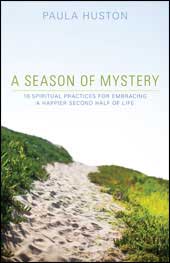 Your can find the book here
Your can find the book here
From the book description:
We live in a culture that tells us there are few things worse than aging, that we should avoid aging at all costs, and that we must shun death. And yet, no matter how much money we spend on health supplements, no matter how many gurus we consult, the fact remains unchanged: We will grow old.
A Season of Mystery is not intended to be a selection of self-improvement secrets; the goal of Huston’s work is to encourage people in the second half of life to become “ordinary mystics†who are no longer bound by the world’s false ideas on aging but instead be freed by God’s grace to embrace the riches that come only with growing older.
Check out  more from Paula - IP#139 Paula Huston – Simplifying Your Soul on Inside the Pages
Tags: Paula Huston
This entry was posted on Friday, February 8th, 2013 at 8:06 am
You can follow any responses to this entry through the RSS 2.0 feed.
What a delight to talk once again with Dr. Thomas Howard.  This time we discuss “Hallowed Be This 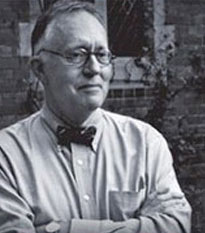 House: Finding Signs of Heaven in Your Home”.  Dr. Howard has such a beautiful gift of recognizing the sacred.  Through this marvelous book, he helps us all to appreciate the many ways in which we too can dive deeper into the “mystery”,  especially in  those ordinary places and things in found in our lives.  This book is a treasure!
House: Finding Signs of Heaven in Your Home”.  Dr. Howard has such a beautiful gift of recognizing the sacred.  Through this marvelous book, he helps us all to appreciate the many ways in which we too can dive deeper into the “mystery”,  especially in  those ordinary places and things in found in our lives.  This book is a treasure!
[powerpress]
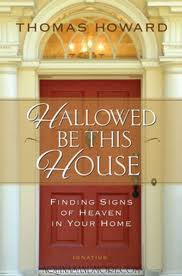 You can find the book here
You can find the book here
Tom Howard, an accomplished writer of great distinction, has the rare gift of being able to express profound truths in whimsical terms. In Hallowed Be This House, he explores with charm and wit the sacramental aspect of our daily lives. I found the book vastly entertaining and, what is more, felt refreshed and the happier of having read it. So, I am sure, will all its readers. —Malcolm Muggeridge
Howard’s vision is the quintessential Catholic, sacramental vision. To read this book is to see with the eyes of Christ. —Peter Kreeft, Handbook of Christian Apologetics
Tags: catholic, catholic podcast, catholic prayer
This entry was posted on Thursday, December 20th, 2012 at 8:00 am
You can follow any responses to this entry through the RSS 2.0 feed.
Fr. Joe Kempf has given us two excellent resources for both adults and kids to help us deal with loss. Â Â Fr. Joe really understands the 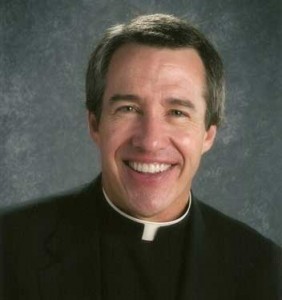 grieving process and offers excellent advice for those at any stage of that journey.
grieving process and offers excellent advice for those at any stage of that journey.
[powerpress]
You can find this book here
Cardinal Timothy Dolan of New York says this about Fr. Kempf’s books: “Fr. Kempf, with grace and sensitivity, helps us learn what to say – and do – in moments when people long for a word of hope and consolation.â€
You can find this book here
From the description:
When the heartaches come, these reflections, prayers, and activities will help every child find their way forward with God. In the back of the book, parents, grandparents, and teachers will find the coaching they need to love their children through the difficult times.
This wonderfully illustrated book meets the child (and the child in each of us) right where we are with just what we need. No one connects faith and real life like Fr. Joe and Big Al. Sometimes Life is Just Not Fair is the perfect book for when the difficult times come…and they visit us all.
Tags: Cardinal Timothy Dolan, Joe Kempf, Pages Fr
This entry was posted on Thursday, December 20th, 2012 at 7:23 am
You can follow any responses to this entry through the RSS 2.0 feed.
Fr. Mitch Pacwa, a leader on the front line of the New Evangelization, once again provides a tremendous resource to enter more deepl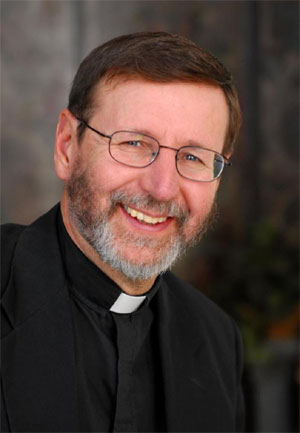 y into this Year of Faith!
y into this Year of Faith!
Steeped in the Divine Wisdom found in our Sacred Scriptures and enlightened by the teachings of the Church, and in particular the insights of Pope Benedict XVI, this is a book not to be missed. Â This is a great resource that can be used by individuals, as well as study groups. Â In this particular discussion, Fr. Pacwa also expands on the events of history that have brought us to this point in our culturally challenge era. Â He shares the importance of the examples found in the lives of the saints, and the call we all have to grow in holiness.
[powerpress]
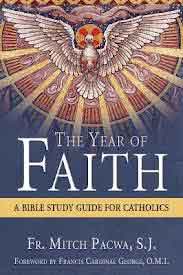 You can find it here
You can find it here
“Dioceses and parishes will benefit from an extremely helpful guide to celebrate this important year. I heartily recommend Father Pacwa’s insightful reflections.” —Bishop Robert J. Baker, S.T.D., Diocese of Birmingham in Alabama
Fr. Mitch Pacwa, S.J., Senior Fellow of the St. Paul Center for Biblical Theology, is a Jesuit priest and popular television host of several EWTN television and radio programs, including EWTN Life and The Holy Rosary in the Holy Land.
Tags: Church, Mitch Pacwa, new evangelization, our sunday visitor, Sacred Scriptures
This entry was posted on Monday, December 10th, 2012 at 6:42 am
You can follow any responses to this entry through the RSS 2.0 feed.
I love this book…what a wonderful introduction on how the Communion of Saints can change our lives.   Colleen Carroll Campbell writes a beautiful memoir that not only chronicles the  important passages of life she’s traveled thus far, but she also shares the guidance and insight she has received from several “sister” saints she has met along the way…St. Teresa of Avila, St. Therese of Lisieux, St. Faustina, St. Teresa Benedicta of the Cross (Edith Stein), Bl. Teresa of Calcutta and, of course, the Queen and Mother of them all, The Blessed Virgin Mary.  This work is more than just a cataloging of the events of her life or facts about these incredible women, Colleen shares a compelling story that is truly a page turner.  It was a book that brought  great joy and peace to my heart; it helped me  to reflect on, and appreciate more fully, those wonderful members of the “Cloud of Witnesses” who have touched my life….what a true gift God has given us in the Communion of the Saints.  A  HIGHLY recommended book on all levels.
Colleen Carroll Campbell writes a beautiful memoir that not only chronicles the  important passages of life she’s traveled thus far, but she also shares the guidance and insight she has received from several “sister” saints she has met along the way…St. Teresa of Avila, St. Therese of Lisieux, St. Faustina, St. Teresa Benedicta of the Cross (Edith Stein), Bl. Teresa of Calcutta and, of course, the Queen and Mother of them all, The Blessed Virgin Mary.  This work is more than just a cataloging of the events of her life or facts about these incredible women, Colleen shares a compelling story that is truly a page turner.  It was a book that brought  great joy and peace to my heart; it helped me  to reflect on, and appreciate more fully, those wonderful members of the “Cloud of Witnesses” who have touched my life….what a true gift God has given us in the Communion of the Saints.  A  HIGHLY recommended book on all levels.
[powerpress]
 You can find the book here
You can find the book here
“Colleen Carroll Campbell has encountered most of the challenges confronting young women today—balancing dating, courtship, and marriage with a successful career, caring for a parent with Alzheimer’s, dealing with infertility—but she hasn’t faced these challenges alone. In My Sisters the Saints, Campbell introduces us to the women who helped her along the way – women like Teresa of Avila, Therese of Lisieux, Edith Stein, and, of course, the Blessed Virgin Mary. Completely contemporary and totally timeless, My Sisters the Saints is an engaging spiritual memoir and the perfect guidebook for anyone who is looking for a companion to help her navigate life’s sometimes difficult and confusing journey.†– Cardinal Timothy Dolan, Archbishop of New York
“In this fascinating memoir, Colleen Carroll Campbell recounts her discovery of kinship with six great women saints at crucial junctures on her journey through life. My Sisters the Saints is the story of how a thoroughly modern woman drew inspiration and strength from her spiritual ‘sisters’ while struggling with the mysteries of life, love, illness, and death in today’s world. This lovely and highly readable book will touch many lives.â€â€¨- Mary Ann Glendon, former U.S. Ambassador to the Vatican, Harvard Law professor, and President of the Pontifical Academy of Social Sciences
Tags: Cardinal Timothy Dolan, Colleen Carroll Campbell, image books, Mary Ann Glendon, women
This entry was posted on Monday, November 5th, 2012 at 1:58 pm
You can follow any responses to this entry through the RSS 2.0 feed.
TERESA OF AVILA: CONTEMPLATIVE AND INDUSTRIOUS
VATICAN CITY, 2 FEB 2011 (vatican.va) –
Dear Brothers and Sisters,
In the course of the Catecheses that I have chosen to dedicate to the Fathers of the Church and to great theologians and women of the Middle Ages I have also had the opportunity to reflect on certain Saints proclaimed Doctors of the Church on account of the eminence of their teaching.
Today I would like to begin a brief series of meetings to complete the presentation on the Doctors of the Church and I am beginning with a Saint who is one of the peaks of Christian spirituality of all time — St Teresa of Avila [also known as St Teresa of Jesus].
St Teresa, whose name was Teresa de Cepeda y Ahumada, was born in Avila, Spain, in 1515. In her autobiography she mentions some details of her childhood: she was born into a large family, her “father and mother, who were devout and feared Godâ€, into a large family. She had three sisters and nine brothers.
While she was still a child and not yet nine years old she had the opportunity to read the lives of several Martyrs which inspired in her such a longing for martyrdom that she briefly ran away from home in order to die a Martyr’s death and to go to Heaven (cf. Vida, [Life], 1, 4); “I want to see Godâ€, the little girl told her parents.
A few years later Teresa was to speak of her childhood reading and to state that she had discovered in it the way of truth which she sums up in two fundamental principles.
On the one hand was the fact that “all things of this world will pass away†while on the other God alone is “for ever, ever, everâ€, a topic that recurs in her best known poem: “Let nothing disturb you, Let nothing frighten you, All things are passing away: God never changes. Patience obtains all things. Whoever has God lacks nothing; God alone sufficesâ€. She was about 12 years old when her mother died and she implored the Virgin Most Holy to be her mother (cf. Vida, I, 7).
If in her adolescence the reading of profane books had led to the distractions of a worldly life, her experience as a pupil of the Augustinian nuns of Santa MarÃa de las Gracias de Avila and her reading of spiritual books, especially the classics of Franciscan spirituality, introduced her to recollection and prayer.
When she was 20 she entered the Carmelite Monastery of the Incarnation, also in Avila. In her religious life she took the name “Teresa of Jesusâ€. Three years later she fell seriously ill, so ill that she remained in a coma for four days, looking as if she were dead (cf. Vida, 5, 9).
In the fight against her own illnesses too the Saint saw the combat against weaknesses and the resistance to God’s call: “I wished to liveâ€, she wrote, “but I saw clearly that I was not living, but rather wrestling with the shadow of death; there was no one to give me life, and I was not able to take it. He who could have given it to me had good reasons for not coming to my aid, seeing that he had brought me back to himself so many times, and I as often had left him†(Vida, 7, 8).
In 1543 she lost the closeness of her relatives; her father died and all her siblings, one after another, emigrated to America. In Lent 1554, when she was 39 years old, Teresa reached the climax of her struggle against her own weaknesses. The fortuitous discovery of the statue of “a Christ most grievously woundedâ€, left a deep mark on her life (cf. Vida, 9).
The Saint, who in that period felt deeply in tune with the St Augustine of the Confessions, thus describes the decisive day of her mystical experience: “and… a feeling of the presence of God would come over me unexpectedly, so that I could in no wise doubt either that he was within me, or that I was wholly absorbed in him†(Vida, 10, 1).
Parallel to her inner development, the Saint began in practice to realize her ideal of the reform of the Carmelite Order: in 1562 she founded the first reformed Carmel in Avila, with the support of the city’s Bishop, Don Alvaro de Mendoza, and shortly afterwards also received the approval of John Baptist Rossi, the Order’s Superior General.
In the years that followed, she continued her foundations of new Carmelite convents, 17 in all. Her meeting with St John of the Cross was fundamental. With him, in 1568, she set up the first convent of Discalced Carmelites in Duruelo, not far from Avila.
In 1580 she obtained from Rome the authorization for her reformed Carmels as a separate, autonomous Province. This was the starting point for the Discalced Carmelite Order.
Indeed, Teresa’s earthly life ended while she was in the middle of her founding activities. She died on the night of 15 October 1582 in Alba de Tormes, after setting up the Carmelite Convent in Burgos, while on her way back to Avila. Her last humble words were: “After all I die as a child of the Churchâ€, and “O my Lord and my Spouse, the hour that I have longed for has come. It is time to meet one anotherâ€.
Teresa spent her entire life for the whole Church although she spent it in Spain. She was beatified by Pope Paul V in 1614 and canonized by Gregory XV in 1622. The Servant of God Paul VI proclaimed her a “Doctor of the Church†in 1970.
Teresa of Jesus had no academic education but always set great store by the teachings of theologians, men of letters and spiritual teachers. As a writer, she always adhered to what she had lived personally through or had seen in the experience of others (cf. Prologue to The Way of Perfection), in other words basing herself on her own first-hand knowledge.
Teresa had the opportunity to build up relations of spiritual friendship with many Saints and with St John of the Cross in particular. At the same time she nourished herself by reading the Fathers of the Church, St Jerome, St Gregory the Great and St Augustine.
Among her most important works we should mention first of all her autobiography, El libro de la vida (the book of life), which she called Libro de las misericordias del Señor [book of the Lord’s mercies].
Written in the Carmelite Convent at Avila in 1565, she describes the biographical and spiritual journey, as she herself says, to submit her soul to the discernment of the “Master of things spiritualâ€, St John of Avila. Her purpose was to highlight the presence and action of the merciful God in her life. For this reason the work often cites her dialogue in prayer with the Lord. It makes fascinating reading because not only does the Saint recount that she is reliving the profound experience of her relationship with God but also demonstrates it.
In 1566, Teresa wrote El Camino de Perfección [The Way of Perfection]. She called itAdvertencias y consejos que da Teresa de Jesús a sus hermanas [recommendations and advice that Teresa of Jesus offers to her sisters]. It was composed for the 12 novices of the Carmel of St Joseph in Avila. Teresa proposes to them an intense programme of contemplative life at the service of the Church, at the root of which are the evangelical virtues and prayer.
Among the most precious passages is her commentary on the Our Father, as a model for prayer. St Teresa’s most famous mystical work is El Castillo interior [The Interior Castle]. She wrote it in 1577 when she was in her prime. It is a reinterpretation of her own spiritual journey and, at the same time, a codification of the possible development of Christian life towards its fullness, holiness, under the action of the Holy Spirit.
Teresa refers to the structure of a castle with seven rooms as an image of human interiority. She simultaneously introduces the symbol of the silk worm reborn as a butterfly, in order to express the passage from the natural to the supernatural.
The Saint draws inspiration from Sacred Scripture, particularly the Song of Songs, for the final symbol of the “Bride and Bridegroom†which enables her to describe, in the seventh room, the four crowning aspects of Christian life: the Trinitarian, the Christological, the anthropological and the ecclesial.
St Teresa devoted the Libro de la fundaciones [book of the foundations], which she wrote between 1573 and 1582, to her activity as Foundress of the reformed Carmels. In this book she speaks of the life of the nascent religious group. This account, like her autobiography, was written above all in order to give prominence to God’s action in the work of founding new monasteries.
It is far from easy to sum up in a few words Teresa’s profound and articulate spirituality. I would like to mention a few essential points. In the first place St Teresa proposes the evangelical virtues as the basis of all Christian and human life and in particular, detachment from possessions, that is, evangelical poverty, and this concerns all of us; love for one another as an essential element of community and social life; humility as love for the truth; determination as a fruit of Christian daring; theological hope, which she describes as the thirst for living water. Then we should not forget the human virtues: affability, truthfulness, modesty, courtesy, cheerfulness, culture.
Secondly, St Teresa proposes a profound harmony with the great biblical figures and eager listening to the word of God. She feels above all closely in tune with the Bride in the Song of Songs and with the Apostle Paul, as well as with Christ in the Passion and with Jesus in the Eucharist. The Saint then stresses how essential prayer is. Praying, she says, “means being on terms of friendship with God frequently conversing in secret with him who, we know, loves us†(Vida 8, 5). St Teresa’s idea coincides with Thomas Aquinas’ definition of theological charity as “amicitia quaedam hominis ad Deumâ€, a type of human friendship with God, who offered humanity his friendship first; it is from God that the initiative comes (cf. Summa Theologiae II-II, 23, 1).
Prayer is life and develops gradually, in pace with the growth of Christian life: it begins with vocal prayer, passes through interiorization by means of meditation and recollection, until it attains the union of love with Christ and with the Holy Trinity. Obviously, in the development of prayer climbing to the highest steps does not mean abandoning the previous type of prayer. Rather, it is a gradual deepening of the relationship with God that envelops the whole of life.
Rather than a pedagogy Teresa’s is a true “mystagogy†of prayer: she teaches those who read her works how to pray by praying with them. Indeed, she often interrupts her account or exposition with a prayerful outburst.
Another subject dear to the Saint is the centrality of Christ’s humanity. For Teresa, in fact, Christian life is the personal relationship with Jesus that culminates in union with him through grace, love and imitation. Hence the importance she attaches to meditation on the Passion and on the Eucharist as the presence of Christ in the Church for the life of every believer, and as the heart of the Liturgy. St Teresa lives out unconditional love for the Church: she shows a lively “sensus Ecclesiaeâ€, in the face of the episodes of division and conflict in the Church of her time.
She reformed the Carmelite Order with the intention of serving and defending the “Holy Roman Catholic Churchâ€, and was willing to give her life for the Church (cf. Vida, 33,5).
A final essential aspect of Teresian doctrine which I would like to emphasize
is perfection, as the aspiration of the whole of Christian life and as its ultimate goal. The Saint has a very clear idea of the “fullness†of Christ, relived by the Christian. At the end of the route through The Interior Castle, in the last “roomâ€, Teresa describes this fullness, achieved in the indwelling of the Trinity, in union with Christ through the mystery of his humanity.
Dear brothers and sisters, St Teresa of Jesus is a true teacher of Christian life for the faithful of every time. In our society, which all too often lacks spiritual values, St Teresa teaches us to be unflagging witnesses of God, of his presence and of his action. She teaches us truly to feel this thirst for God that exists in the depths of our hearts, this desire to see God, to seek God, to be in conversation with him and to be his friends.
This is the friendship we all need that we must seek anew, day after day. May the example of this Saint, profoundly contemplative and effectively active, spur us too every day to dedicate the right time to prayer, to this openness to God, to this journey, in order to seek God, to see him, to discover his friendship and so to find true life; indeed many of us should truly say: “I am not alive, I am not truly alive because I do not live the essence of my lifeâ€.
Therefore time devoted to prayer is not time wasted, it is time in which the path of life unfolds, the path unfolds to learning from God an ardent love for him, for his Church, and practical charity for our brothers and sisters. Many thanks.
Check out Teresa of Avila’s Discerning Hearts Page
Tags: st teresa, st teresa of jesus, Teresa of Avila, Teresa of Jesus
This entry was posted on Monday, October 15th, 2012 at 12:11 am
You can follow any responses to this entry through the RSS 2.0 feed.
[powerpress]
Below a Vatican Radio translation of the Holy Father’s catechesis from original text in Italian.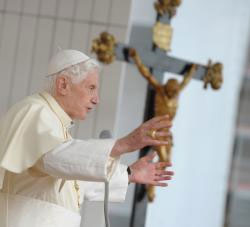
Dear Brothers and Sisters,
In the last catechesis I began speaking about one of the privileged sources of Christian prayer: the sacred liturgy, which – as the Catechism of the Catholic Church affirms – is “participation in Christ’s own prayer addressed to the Father in the Holy Spirit†(Catechism of the Catholic Church, 1073). In the liturgy, all Christian prayer finds its source and goal.”(n. 1073). Today I would like us to ask ourselves: in my life, do I reserve enough space for prayer and, above all, what place does liturgical prayer have in my relationship with God, especially the Mass, as participation in the common prayer of the Body of Christ which is the Church ?In answering this question we must first remember that prayer is the living relationship of the children of God with their Father who is good beyond measure, with his Son Jesus Christ, and the Holy Spirit (cf. ibid., 2565). Therefore, the life of prayer lies in habitually being in the presence of God and being conscious of it, in living our relationship with God just as we live the usual relationships of our lives, those with close family members, and with real friends; indeed our relationship with the Lord gives light to all of our other relationships. This communion of life with God, One and Triune, is possible because, through Baptism we have been inserted into Christ, we have begun to be one with Him (cf. Rom 6:5).
In fact, only in Christ we can talk to God the Father as children, otherwise it is not possible, but in communion with the Son, we too can say, as he said “Abba”, because only in communion with Christ, can we know God as our true Father (cf. Mt 11:27). For this Christian prayer lies in constantly looking, in an ever new way, at Christ, talking with Him, being in silence with Him, listening to Him, acting and suffering with Him. The Christian rediscovers his true identity in Christ, “the firstborn of every creature », in whom all things were created (cf. Col 1:15 ff). By identifying with Him, being one with Him, I discover my personal identity, that of the true child who sees God as a Father full of love.
But do not forget: we discover Christ, we know him as a living Person, in the Church. It is “his Body.” This embodiment can be understood from the biblical words on man and woman: the two shall become one flesh (cf. Gen 2:24, Ephesians 5.30 ff. 1 Cor 6.16 s). The unbreakable bond between Christ and the Church, through the unifying power of love, does not negate the ‘you’ or ‘I’, but raises them to their most profound unity. Finding one’s true identity in Christ means achieving communion with him, that does not cancel me out, but raises me to the highest dignity, that of a child of God in Christ, “the love-story between God and man consists in the very fact that this communion of will increases in a communion of thought and sentiment, and thus our will and God’s will increasingly coincide “(Encyclical Deus Caritas Est, 17). To pray means to rising towards the heights of God through a necessary gradual transformation of our being.
Thus, participating in the liturgy, we make ours the language of the Mother Church, we learn to speak it and for it. Of course, as I have already said, this takes place in a gradual manner, little by little. I have to progressively immerge myself in the words of the Church, with my prayer, my life, my suffering, my joy, my thoughts. It is a journey that transforms us.
This entry was posted on Thursday, October 4th, 2012 at 6:11 am
You can follow any responses to this entry through the RSS 2.0 feed.
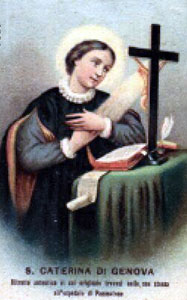 Jesus in your heart! Eternity in your mind! The will of God in all your actions! But above all, love, God’s love, entire love!
Jesus in your heart! Eternity in your mind! The will of God in all your actions! But above all, love, God’s love, entire love!
– St. Catherine of Genoa
St. Catherine of Genoa’s life is one that testified to the power that regular confessions and frequent Communion can have in helping us see the direction (or drift) of our life with God. Isn’t it interesting that people who have a realistic sense of their own sinfulness and of the greatness of God are often the ones who are most ready to meet the needs of their neighbors. Catherine’s life testifies to that as well.  She’s best known for her “Treatise on Purgatory” . She gave tirelessly to the needs of the poor and sick. Beautiful, married young to…well, should we be charitable and say…”an unpleasant fellow ” (Ok, he was a jerk) at 16.  During the course of ten years within the marriage, Catherine began to slowly slide into worldliness, not necessarily a sinful life, but not the one of holiness she had desired before her marriage. And then it happened, Catherine experienced a powerful encounter with the Holy Spirit in a dramatic life-changing mystical moment at the age of 26. Again you can read more about in “Treatise on Purgatory“. Her life of prayer and service to the poor and needy would effect her husband as well; his conversion is a strong testament to the fruits of her relationship with God. She reminds me a little of Mother Teresa, in that her deep, deep prayer led her to serve Him in those around her.
“Since I began to love, love has never forsaken me. It has ever grown to its own fullness within my innermost heart.” – St. Catherine of Genoa.  And it’s true…God is love, expand and make more room for Him and He will fill the space.
From Approved Apparitions:
“Catherine lived in holy obedience to God as He guided her to do His Will as He spoke to her interior,
“My daughter, observe these three rules, namely: never say I will or I will not. Never say mine, but always ours. Never excuse yourself, but always accuse yourself. When you repeat the `Our Father’ take always for your maxim, Fiat voluntas tua, that is, may his will be done in everything that may happen to you, whether good or ill; from the `Hail Mary’ take the word Jesus, and may it be implanted in your heart, and it will be a sweet guide and shield to you in all the necessities of life. And from the rest of Scripture take always for your support this word, Love, with which you will go on your way, direct, pure, light, watchful, quick, enlightened, without erring, yet without a guide or help from any creature; for love needs no support, being sufficient to do all things without fear; neither does love ever become weary, for even martyrdom is sweet to it. And, finally, this love will consume all the inclinations of the soul, and the desires of the body, for the things of this life.”
 Though Catherine lived a life of austere penance she did so for she understood how deadly is sin to the soul as a child of God can quickly turn to become a child of the Devil, if they choose to willfully disobey God through their actions. As Catherine explained, “If it were possible for me to suffer as much as all the martyrs have suffered, and even hell itself, for the love of God, and in order to make satisfaction to him, it would be after all only a sort of injury to God, in comparison with the love and goodness with which he has created, and redeemed, and, in a special manner, called me. For man, unassisted by God’s grace, is even worse than the devil, because the devil is a spirit without a body, while man, without the grace of God, is a devil incarnate. Man has a free will, which, according to the ordination of God, is in nowise bound, so that he can do all the evil that he wills; to the devil, this is impossible, since he can act only by the divine permission; and when man surrenders to him his evil will, the devil employs it, as the instrument of his temptation.”. (more…)
Tags: catholic, catholic podcast, catholic prayer, cathollc spirituality
This entry was posted on Saturday, September 15th, 2012 at 12:34 am
You can follow any responses to this entry through the RSS 2.0 feed.
What a joy to have the opportunity to talk once again with Fr. Michael Gaitley at the 2012 CMN Trade Show in Dallas, TX. Â We 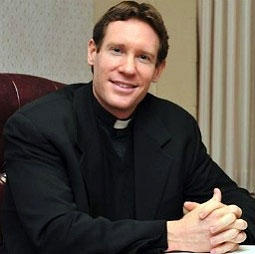 discuss the Year of Faith, “Consoling the Heart of Jesus” and his new book coming soon…”The One Thing is Three”. Â We talk about how the New Evangelization and the role model that Bl. John Paul II was to all of us. Â We all discuss “All Hearts a Fire” the new parish based program which is absolutely FANTASTIC! Â Be sure to check it out and pass it on!
discuss the Year of Faith, “Consoling the Heart of Jesus” and his new book coming soon…”The One Thing is Three”. Â We talk about how the New Evangelization and the role model that Bl. John Paul II was to all of us. Â We all discuss “All Hearts a Fire” the new parish based program which is absolutely FANTASTIC! Â Be sure to check it out and pass it on!
[powerpress]
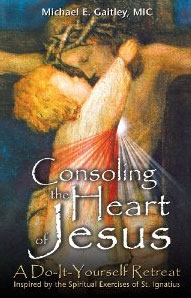 You can find the book here
You can find the book here
Michael Gaitley, MIC’s book is a form of a weekend retreat accessible to those at the beginning stages of a simple way to holiness. While reading this book, I wished I could have had it in conversing with people of little or practically no faith who yet had a longing for the faith that lies at the core of human existence. These hearts are restless until they rest in Thee, Lord and this book guides them on a journey to resting in God. –Fr. Mitch Pacwa
Tags: catholic, catholic podcast, catholic prayer, cathollc spirituality
This entry was posted on Monday, September 10th, 2012 at 9:00 am
You can follow any responses to this entry through the RSS 2.0 feed.





